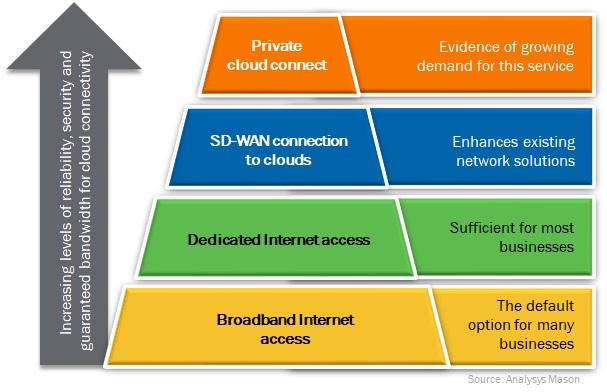Liquid Telecom’s cloud connectivity strategy in Africa may enable it to play a wider role in the cloud market
08 April 2019 | Research
Article | PDF (3 pages) | The Middle East and Africa| Enterprise Services

Widespread adoption of cloud services needs reliable high-speed connectivity, and a satisfactory solution to data governance rules. In high-income markets, these requirements are already well-met, but telecoms operators can play a significant role in improving both measures in many low- and middle-income countries.
This article outlines Liquid Telecom's approach to supporting business use of cloud with its connectivity services.
The growing presence of global cloud providers in Africa will accelerate adoption of cloud services in the region
Several of the major global cloud providers are developing a greater presence in Africa. Microsoft went live with its first data centres in South Africa in March 2019, Huawei Cloud has been providing a localised public cloud service in South Africa since March 2019 and Amazon Web Services (AWS) has announced plans for infrastructure in South Africa in 1H 2020.
The roll-out of these services will accelerate adoption of cloud services in South Africa. Microsoft's presence is particularly significant because it accounts for a major part of the cloud market in Africa due to the popularity of Office365. The ability to store data locally will address data sovereignty requirements as well as reducing latency and removing the need to rely on trans-continental cables.
Analysys Mason estimates that revenue from public cloud services delivered to businesses in South Africa will reach USD170 million by 2023, accounting for more than half of all such revenue across Sub-Saharan Africa as a whole.
Dedicated cloud connectivity could be an important enabler for cloud adoption in low- and middle-income regions
Many businesses connect to cloud services via the public Internet, using either dedicated Internet access or broadband services. However, there is a growing market for private, dedicated connectivity into clouds, often referred to as 'cloud connect' services. In Africa (and other low- and middle-income regions), the alternative connectivity solutions are often much weaker and the use of private, dedicated connectivity can significantly improve the performance of cloud services, making them viable for many more businesses.
Figure 1: Cloud connect services play an important role as enterprise networks evolve around increasing cloud usage

Liquid Telecom began offering cloud connect services in Africa in mid-2018; its first customers are large organisations from the financial and government sectors in South Africa, but it sees considerable potential across the other African countries in its footprint. Its offer includes direct provision of Microsoft ExpressRoute and AWS Direct Connect to Europe, and access to other cloud platforms via connectivity with Equinix in London. It aims to connect directly with cloud providers as and when they build out to Africa, providing a flexible and high-quality connectivity offer for the most relevant clouds.
In high-income countries, cloud connect providers have developed a larger number of direct relationships with major cloud platforms and sometimes more-sophisticated features such as dynamic bandwidth capabilities and enhanced security. However, Liquid Telecom's offer seems appropriate for its context.
- Its initial offer was launched with Microsoft, probably the major player in the African cloud market.
- Its 10Mbps entry points can be scaled as customer requirements grow, recognising that many of its customers may not yet have migrated many of their applications to the cloud.
- Its approach of seeking direct connectivity with cloud platforms enables it to resell wholesale trunk ports to systems integrators and other channel partners.
Liquid Telecom operates a nearly 70 000km fibre network across 13 countries in Eastern, Central and Southern Africa and cloud connectivity is a natural fit with its network assets. Liquid Telecom bundles cloud connectivity with its pan-African fibre network to deliver an end-to-end service from across Africa into the cloud. However, it faces competition from Teraco, which also provides Microsoft ExpressRoute in South Africa and from operators providing Internet-based and SD-WAN enhanced cloud connectivity. It will need to develop a credible SD-WAN solution of its own to meet the needs of price-sensitive enterprises.
Liquid Telecom aims to facilitate access to local cloud across Africa
The ability to store and process data in South Africa may be perceived as an advantage in some neighbouring countries too, but many enterprises and government organisations would prefer to ensure in-country data storage before committing to significant cloud migration. Huawei has indicated that it plans to roll out cloud services across the continent, but it is unlikely that global cloud providers will deploy many further African nodes soon.
Liquid Telecom's Cloud Connect enables direct connectivity to start-up cloud providers that have localised IaaS and SaaS offerings for African markets. These local providers charge in local currency rather than US dollars, which can protect businesses from currency fluctuations.
Liquid Telecom has also launched its own Azure Stack regions in Harare and Dar es Salaam, and plans to add Nairobi and Kigali in 1H 2019. It lacks the full functionality of public Azure, but it delivers many of the established features and some of the cost savings, with the advantage of locally held data and a straightforward migration path to public Azure. Liquid Telecom offers wholesale access to its Azure Stack through its channel partner programme and this additional network traffic provides a clear benefit for its core connectivity business.
Cloud connectivity services may enable Liquid Telecom to offer a more sophisticated solution in future
Liquid Telecom views Cloud Connect as a key element in its wider cloud portfolio, alongside the Azure Stack deployments, support for Office365 and other SaaS applications. It aspires to provide managed multi-cloud solutions as cloud deployment increases in the region, making the transition to becoming a fully integrated digital solutions provider. To be successful, Liquid Telecom will undoubtedly need to rely, as many other operators have done, on partnerships and acquisitions to gain expertise and to provide a level of service wrap that will enable it to achieve reasonable margins.
Downloads
Article (PDF)Authors

Catherine Hammond
Research DirectorLatest Publications
Tracker
Public cloud provider and CSP partnership tracker 1H 2024
Article
Operators cannot rely on price rises to boost revenue in 2024 but digital services could help
Forecast report
Worldwide operator business services for large enterprises: forecast 2023–2028
